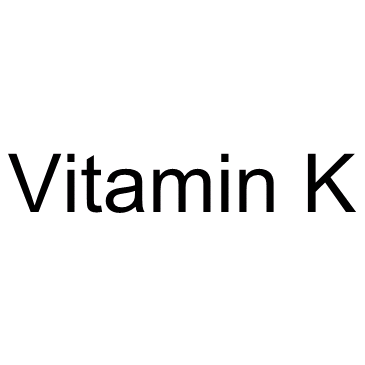Vitamin K |
| Katalog-Nr.GC32531 |
Vitamin K, das Blutgerinnungsvitamin, ist wichtig fÜr die Funktion zahlreicher Proteine im KÖrper, wie zB der Gerinnungsfaktoren, Osteocalcin und Matrix-Gla-Protein.
Products are for research use only. Not for human use. We do not sell to patients.

Cas No.: 12001-79-5
Sample solution is provided at 25 µL, 10mM.
Vitamin K is a group of fat soluble vitamins, important for the function of numerous proteins within the body, such as the coagulation factors, osteocalcin and matrix-Gla protein.
Phylloquinone (vitamin K1) and Menaquinones (vitamin K2) are the two naturally occurring forms of vitamin K. Phylloquionone is the major dietary source of vitamin K and is found at highest concentrations in green leafy vegetables[1]. Vitamin K2 (menaquinone) is found in small amounts in chicken, butter, egg yolks, cheese and fermented soyabeans. Vitamin K1 and vitamin K2 are required for the γ-glutamyl carboxylation of all vitamin K-dependent proteins[2]. Vitamin K has important actions in the nervous system. Vitamin K contributes to the biological activation of proteins Gas6 and protein S, ligands for the receptor tyrosine kinases of the TAM family (Tyro3, Axl, and Mer). In brain, vitamin K also participates in the synthesis of sphingolipids, an important class of lipids present in high concentrations in brain cell membranes[3].
Vitamin K is well-known for its function in blood coagulation. Several human studies report the beneficial role of vitamin K supplementation in improving insulin sensitivity and glucose tolerance, preventing insulin resistance, and reducing the risk of type 2 diabetes[1]. The adequate intake for vitamin K has been proposed to be 90 µg/day for women and 120 µg/day for men[2]. Vitamin K deficiency results in an increase in undercarboxylated osteocalcin, a protein with low biological activity. Several studies have demonstrated that low dietary vitamin K intake is associated with low bone mineral density or increased fractures. Additionally, vitamin K supplementation has been shown to reduce undercarboxylated osteocalcin and improve the bone turnover profile[4].
[1]. Manna P, et al. Beneficial role of vitamin K supplementation on insulin sensitivity, glucose metabolism, and the reduced risk of type 2 diabetes: A review. Nutrition. 2016 Jul-Aug;32(7-8):732-9. [2]. DiNicolantonio JJ, et al. The health benefits of vitamin K. Open Heart. 2015 Oct 6;2(1):e000300. [3]. Ferland G, et al. Vitamin K, an emerging nutrient in brain function. Biofactors. 2012 Mar-Apr;38(2):151-7. [4]. Bügel S, et al. Vitamin K and bone health. Proc Nutr Soc. 2003 Nov;62(4):839-43.
Average Rating: 5 (Based on Reviews and 6 reference(s) in Google Scholar.)
GLPBIO products are for RESEARCH USE ONLY. Please make sure your review or question is research based.
Required fields are marked with *



















